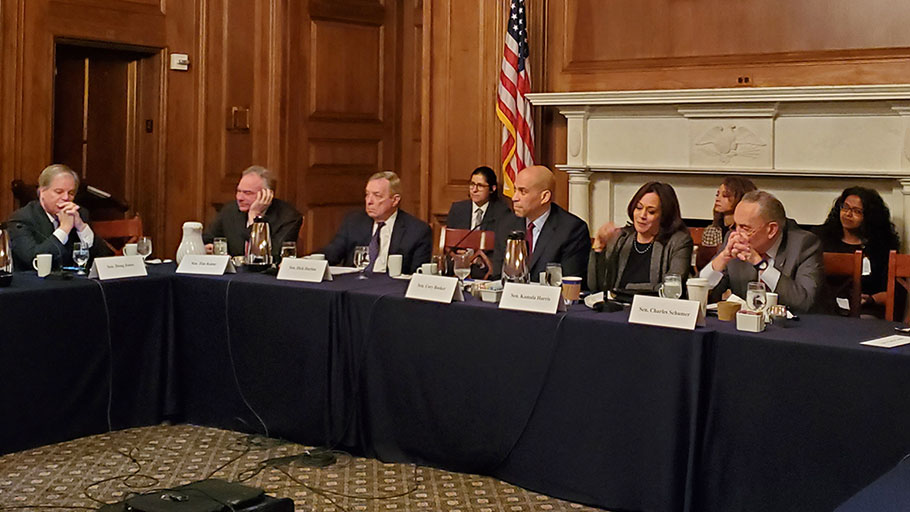When asked what challenges she and fellow Sen. Cory Booker (D-N.J.) faced as Black candidates during their 2019 run for president, Kamala Harris (D-Calif.) urged everyone in the room to close their eyes.
“Then, imagine the boy next door and think of a four-letter word phrase that would define mine and Cory’s campaign,” Harris said.
“You don’t have it. It doesn’t exist. So, we had to consistently explain who we are as people, and our character.”
It seemed quite the metaphor for a roundtable discussion on Capitol Hill on Wednesday, March 11.
Led by Sens. Harris and Booker, the frank one-hour conversation tackled everything from voter suppression to the coronavirus.
Only journalists of color received an invitation to the event, which included remarks from Sens. Chuck Schumer (D-NY), Tim Kaine (D-Va.), Doug Jones (D-Ala.), Bob Casey (D-Pa.), and several others.
The senators said they wanted to open the floor to issues that pertain mostly to African Americans.
Kaine, who has openly championed the Black Press of America, said he was pleased that the National Newspaper Publishers Association (NNPA) was among the news organizations represented.
The NNPA is a trade organization of the more than 220 African-American owned newspapers and media companies in the United States.
Harris said the gathering was important, particularly since just 7.5 percent of American journalists are Black, and that was evident as she hit the campaign trail last year.
“I wish more Blacks were covering me,” Harris continued.
She noted that while campaigning for president, White journalists proved unfamiliar with her Alpha Kappa Alpha sorority or the Divine 9. Another White reporter asked her why she chose to attend Howard University, a historically Black college and university.
“Howard University is referred to as the Mecca,” Harris stated.
Schumer said voting rights and protections are among the primary issues facing the country, particularly African Americans.
“One of the three worst decisions of this Supreme Court was Shelby County vs. Holder, which eliminated a key provision of the 1965 Voting Rights Act,” Schumer noted. “That’s because [Chief Justice] John Roberts said there’s no longer any racism.”
Because of the rising crisis that is the coronavirus, the senators each said they’re working diligently to ensure that Blacks and all Americans receive necessary relief.
“Coronavirus is the news that’s driving the country and the world,” Schumer proclaimed. “I’m very worried that the president’s incompetence and lack of focus are hurting us. He seems more focused on the Stock Market than the supermarket, to quote Stacey Abrams.”
Schumer added that he hopes that President Trump refrains from attaching fighting the coronavirus to his campaign, thus minimizing the seriousness of the disease by making it a political issue.
“He needs to put people before corporations and take appropriate steps,” Schumer stated. He outlined part of a proposal that he’s working on with House Speaker Nancy Pelosi (D-Calif.).
“Speaker Pelosi and I have called for, and the House will pass, paid sick leave for workers impacted by quarantine orders and not just those who can’t work, but if schools are closed, it will apply.”
Schumer continued.
“Enhanced unemployment and do it quickly and do it fast. Food security, both in terms of SNAP and for many kids, their best meal is at school. So, we have to figure out a way to get those lunches and breakfast delivered to people’s homes if the kids are not going to school.
“We also have to have protection for frontline workers, and tests and the administration of tests shouldn’t cost anything. Doctors shouldn’t be allowed to charge a fee. This is a very important issue.”
Each of the senators stressed that universal health care is needed in the United States.
They promised to work toward such a plan if Democrats can take back the Senate while maintaining control of the House this fall.
Schumer, Booker, Harris, and the rest of their colleagues noted the importance of getting their message to journalists of color.
“This is a time where having a free press is more important than ever before,” Booker said.
“I can’t stress the importance of Black journalists and Black journalism,” Harris stated.
“Had Ida B. Wells not been present with her voice and her willingness to speak on the issues of the day, the issues of lynching in America would not have taken on the dialogue it absolutely deserved. She started that discussion in a real way.
“JET Magazine. Had Emmett Till’s mother not trusted Simeon Booker to appropriately tell her story and treat that photograph with dignity, the story of Emmett Till would not have taken on the importance that it did.”
This article was originally published by the National Newspaper Publishers Association.















